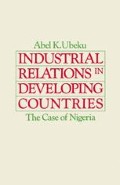Abstract
We have already identified the parties (actors) in an industrial relations system to be: the workers and their organisations, the employers and their associations, and the government and its agencies. These parties create the institutional framework that develops a ‘web of rules’ which govern the industrial relations system in any country. In this chapter we shall examine the development, role and impact of these parties and determine the contribution of each to the evolution of the industrial relations system in Nigeria.
Access this chapter
Tax calculation will be finalised at checkout
Purchases are for personal use only
Preview
Unable to display preview. Download preview PDF.
Notes and References
J. I. Roper, Labour Problems in West Africa (Penguin, 1958) p. 49.
T. M. Yesufu, An Introduction to Industrial Relations in Nigeria (Oxford University Press, 1962) p. 33.
P. C. W. Gutkind et al., African Labour History (Sage Publications, 1978) p. 37.
See B. C. Roberts, Labour in the Tropical Territories of the Commonwealth (Bell, 1964) p. 178.
See R. Melson, ‘Nigerian Politics and the General Strike of 1964’, in Protest and Power in Black Africa, ed. R. I. Rotberg and A. A. Mazrui (Oxford University Press, 1970) pp. 771–87.
M. O. Abiodun, Restructuring Trade Unions in Nigeria: 1976–78 (Salama Press, 1978) p. 8.
A. J. Peace, Choice, Class and Conflict: A Study of Southern Nigerian Factory Workers (Harvester Press, 1979) chs 5 and 6.
O. Oloko, ‘Industrial Unions: Their Effects on Industrial Relations in the Nigerian Economy’, paper presented at the Institute of Personnel Management conference, Lagos (30 October 1980).
J. F. Weeks, ‘A Comment on Peter Kilby: Industrial Relations and Wage Determination’, Journal of Developing Areas, vol. 3 (Oct 1968) pp. 7–18.
E. J. Berg, ‘Urban Real Wages and the Nigerian Trade Union Movement, 1939–60: A Comment’, Economic Development and Cultural Change, vol. 17 (1969) pp. 604–17.
P. Kilby, ‘Industrial Relations and Wage Determination: Failure of the Anglo-Saxon Model’, Journal of Developing Areas, vol. 1 (July 1967) pp. 489–520.
W. M. Warren, ‘Urban Real Wages and the Nigerian Trade Union Movement, 1939–60’, Economic Development and Cultural Change, vol. 15 (1966) pp. 21–36.
J. S. Coleman, Nigeria: Background to Nationalism (University of California Press, 1965) p. 256.
R. Cohen, Labour and Politics in Nigeria (Heinemann, 1974) p. 161.
W. Ananaba, The Trade Union Movement in Nigeria (Ethiope Publishing Corporation, 1969) p. 93.
R. V. Grillo, ‘The Tribal Factor in an East African Trade Union’, in Tradition and Transition in East Africa, ed. P. H. Gulliver (University of California Press, 1969) p. 320.
G. Travernier, ‘The Militant Managers’, International Management, vol. 33, no. 2 (Feb 1978) pp. 12 and 15.
B. C. Roberts and L. Greyfié de Bellecombe, Collective Bargaining in African Countries (Macmillan, 1967) pp. 37–9, 60–1.
C. P. Kindleberger, Economic Development (1958) p. 223,
cited by K. Schweinitz Jr, ‘Industrialisation, Labour Control and Democracy’, Economic Development and Cultural Change, vol. 7, no. 4 (1959) p. 385.
A Mehta, ‘The Mediating Role of the Trade Union in Underdeveloped Countries’, Economic Development and Cultural Change, vol. 6 (Oct. 1957) pp. 16–23.
A. Sturmthal, ‘Unions and Economic Development’, Economic Development and Cultural Change, vol. 8 (1959) pp. 199–205.
W. Galenson (ed.), Labor and Economic Development (John Wiley, 1959) p. 13.
W. H. Friedland, Vuta Kamba: The Development of Trade Unions in Tanganyika (Hoover Institution Press, 1969) p. 58.
T. Bums (ed.), Industrial Man (Penguin, 1969) p. 7.
A. Tevoedjre, ‘A Strategy for Social Progress in Africa and the ILO’s Contribution’, International Labour Review, vol. 99, no. 1 (Jan. 1969) p. 77.
Author information
Authors and Affiliations
Copyright information
© 1983 Abel K. Ubeku
About this chapter
Cite this chapter
Ubeku, A.K. (1983). The Parties in the Industrial Relations System. In: Industrial Relations in Developing Countries. Palgrave Macmillan, London. https://doi.org/10.1007/978-1-349-17265-8_3
Download citation
DOI: https://doi.org/10.1007/978-1-349-17265-8_3
Publisher Name: Palgrave Macmillan, London
Print ISBN: 978-0-333-36013-2
Online ISBN: 978-1-349-17265-8
eBook Packages: Palgrave Economics & Finance CollectionEconomics and Finance (R0)

